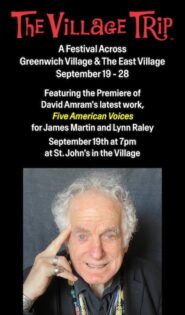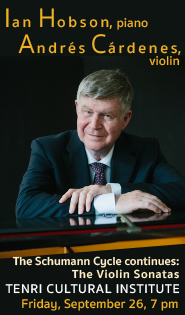Mezzo Cecelia Hall displays beguiling artistry in Weill recital
Marilyn Horne got a generous hand when she walked on to the stage of Weill Hall and quipped “I’m still here!”
“The Song Continues,” Horne’s annual weeklong young artist program, offers a series of recitals and master classes with Horne and, this year, Christa Ludwig. The week got off to a very fine start on Monday with a recital showcasing the promising young mezzo-soprano Cecelia Hall.
Hall opened with a pair of Purcell songs, first “If music be the food of love.” The title—and first line—may be Shakespeare’s, but the rest of the text, a poem by Henry Heveningham, is steamier than the Bard’s passionate lament. It is a direct appeal to a would-be lover, and here and elsewhere on the program Hall displayed a tendency to let her over-acting get away from her. Authentic connection to text is an important part of interpretation, and can have visible physical manifestations. More complete acting, especially when working with a partner, is vital in an operatic setting, but making eyes at the back wall of a small recital hall like Weill is more distracting than alluring.
Fortunately, her “recital-acting” did not detract significantly from her vocal work. She displayed a viscous, honeyed tone that was nevertheless light enough to achieve some fluttering coloratura. Her English diction was crisp, though overly glottal in “I attempt from Love’s sickness to fly.” In both songs she brought sensitive phrasing to Purcell’s melismata, which are frequent and exceptionally long.
Of the four languages she sang on Monday, Hall’s Italian felt the least comfortable, chewed ever so slightly. She performed Monteverdi’s “Si dolce è ‘l tormento,” singing with forward clarity up top and smoke at the bottom. In between she was less secure, particularly in the transition to her chest voice, which was sometimes muscled through. Her Lamento d’Arianna was sublime, charged with pathos but not smothered, allowing the tone to breathe.
In her German selections there was less physical gesture and more good, old-fashioned poise. Schumann’s “Widmung” shone passionately, followed by a sublime and tender “Mondnacht.” Accompanist Ken Noda had a few heavy spots in the latter, but mostly matched Hall’s gentle sensitivity.
She was joyful, even cheeky in Mahler’s “Frühlingsmorgen,” and followed it up with one of the evening’s highlights in “Liebst du um Schönheit,” which she dedicated to her husband. A gorgeous and touching lied, its speaker beseeches a lover not to love for beauty or youth, but for love’s own sake. Hall’s reading was arrestingly simple, an earnest and loving plea. She sang with complete ease, melting in her middle register and raising a hair or two as she soared to the top of the line “liebe die sonne.”
The four songs of Arnold Schoenberg’s opus 2 bear little resemblance to the later serialist works that would make the composer’s name. These lieder are sometimes eerie, sometimes soothing, but always richly melodious—this is “Schoenberg before Schoenberg was Schoenberg.”
Hall brought them off wonderfully. In the stunning “Erwartung” she found a broader, darker sound than we’d heard on the rest of the program, and it came to her absolutely naturally. She brought out the obsessive intensity of “Schenk mir deinen goldenen Kamm,” and while a few top notes felt like a bit of a reach her “Erhebung” bloomed. Only the “Waldsonne” seemed at all off, as she was tight, especially around a few haphazard-sounding jumps.
Hall’s French isn’t perfect by any means, but her voice sounded magnificent in the language and she ended strong with a set of songs by three very different composers. She had a light, delightfully flitting warble in André Messager’s cheeky and coquettish “J’ai deux amants,” while she filled her marvelous, dark vowels with lush velvet in Poulenc’s “Hôtel.” In “Les chemins de l’amour” she was remarkably poignant, combining idiomatic phrasing with free tone.
The final listed piece was a cabaret number, “Quand je danse avec lui,” by Jean Eblinger. She channeled a little Piaf, getting sultry smoke into her singing and giving her spoken asides a wry twist that earned laughs every time.
Her encore was “Lorelei” from the Gershwin brothers’ Pardon My English. The show was a notorious flop, but Hall’s performance of this number certainly wasn’t—It can be a touch awkward to hear a singer apply operatic technique to Broadway numbers, but she struck an excellent balance, lightening up just enough to let the song “pop” without getting at all “belty.”
The next recital in “The Song Continues” will feature baritone Joseph Lim 5:30 p.m. Wednesday. carnegiehall.org
Eric C. Simpson is the Hilton Kramer Fellow at The New Criterion


